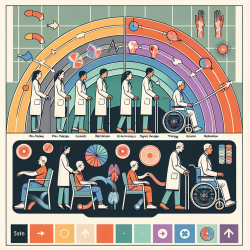Understanding the Impact of School Stress and Socioeconomic Status on Adolescents
As educators and practitioners in the field of adolescent mental health, it is crucial to understand the complex interplay between school-related stress and family socioeconomic status (SES) and their impact on depressive symptoms in adolescents. A recent study titled Effort-Reward Imbalance at School and Depressive Symptoms in Chinese Adolescents: The Role of Family Socioeconomic Status sheds light on these dynamics and offers valuable insights for improving our practice.
Key Findings from the Study
The study, conducted on a sample of 1,774 Chinese adolescents, utilized the Effort-Reward Imbalance (ERI) model to measure school-related stress and its association with depressive symptoms. The findings revealed that high school-related stress and low family SES were significantly associated with increased odds of depressive symptoms. Notably, the effect of school-related stress was particularly pronounced in adolescents from low SES backgrounds.
Specifically, the odds of experiencing depressive symptoms were 9.18 times higher in adolescents facing both high school stress and low SES compared to those with low stress and high SES. This indicates a significant synergistic interaction between school stress and socioeconomic challenges.
Implications for Practitioners
These findings underscore the need for targeted interventions in school settings, particularly for students from low SES backgrounds. Here are some strategies practitioners can consider implementing:
- Develop Tailored Support Programs: Create programs that specifically address the unique challenges faced by students from low SES backgrounds, focusing on building resilience and coping skills.
- Enhance School Environment: Work towards creating a supportive and inclusive school environment that reduces stress and fosters positive social interactions among students.
- Collaborate with Families: Engage with families to understand their socioeconomic challenges and provide resources or referrals to support services that can alleviate some of these pressures.
- Promote Mental Health Awareness: Educate students, teachers, and parents about the signs of depression and the importance of mental health, encouraging open discussions and reducing stigma.
Encouraging Further Research
While this study provides valuable insights, it also highlights the need for further research to explore these dynamics in different cultural contexts and over longer periods. Practitioners are encouraged to stay informed about new findings and incorporate evidence-based practices into their work.
By understanding and addressing the combined effects of school stress and socioeconomic challenges, we can better support adolescents in achieving their full potential and maintaining their mental well-being.
To read the original research paper, please follow this link: Effort-Reward Imbalance at School and Depressive Symptoms in Chinese Adolescents: The Role of Family Socioeconomic Status.










